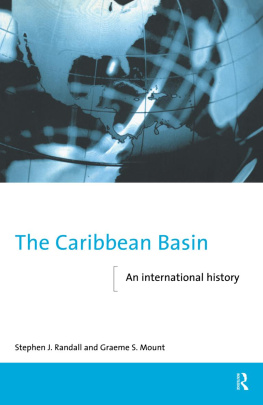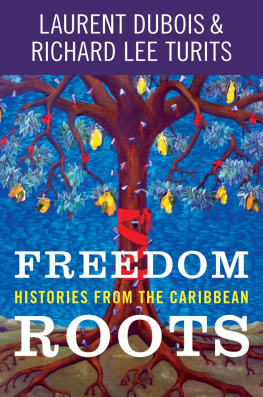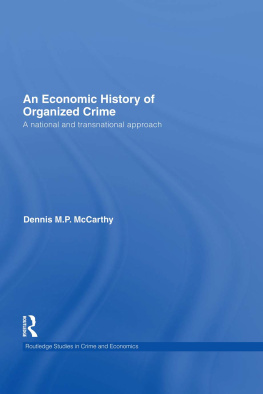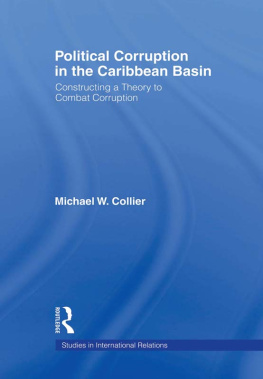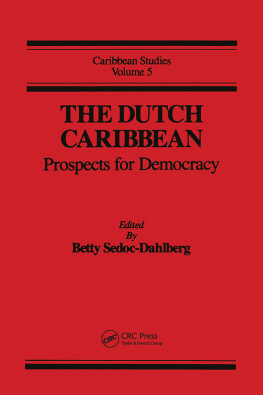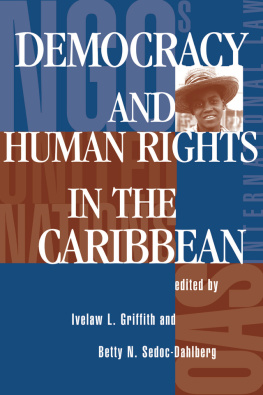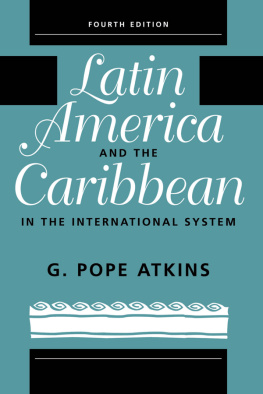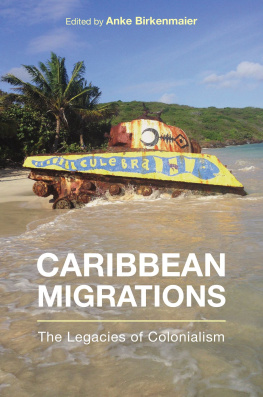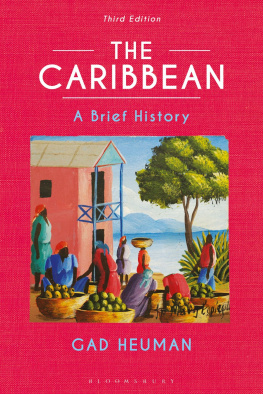THE CARIBBEAN BASIN
The Caribbean basin has been the scene of international rivalries and conflict throughout the modern period. The Caribbean Basin provides a study of the entire Caribbean region, including Central America and the Caribbean coast of northern South America, as well as an analysis of the role of international intervention.
This history of the modern Caribbean includes discussion of the complex interaction among major world powers in the area, from the British, Dutch, French and Spanish clashes through the Latin American wars of independence to the emergence of the United States as a colonial power in the late nineteenth century. The book also surveys conflicts over colonial possessions, trade routes and SovietAmerican confrontation in the Cold War years.
This study integrates the regions recent political, economic and social history with its military and diplomatic past. The Caribbean Basin charts this zones emergence from colonialism during the course of the twentieth century.
Stephen J. Randall is Professor of History and Dean, Faculty of Social Science, University of Calgary, Canada. Graeme S. Mount is Professor of History, Laurentian University, Ontario, Canada.
THE NEW INTERNATIONAL HISTORY SERIES
Edited by Gordon Martel
Professor of History at the University of Northern British Columbia, and Senior Research Fellow at De Montfort University.
EXPLAINING AUSCHWITZ AND HIROSHIMA
History writing and the Second World War, 19451990
R. J. B. Bosworth
IDEOLOGY AND INTERNATIONAL RELATIONS IN THE MODERN WORLD
Alan Cassels
GLOBAL COMMUNICATIONS, INTERNATIONAL AFFAIRS AND THE MEDIA SINCE 1945
Philip M. Taylor
THE CARIBBEAN BASIN
An international history
Stephen J. Randall and Graeme S. Mount
Forthcoming:
WAR AND COLD WAR IN THE MIDDLE EAST
Edward Ingram
NORTH EAST ASIA
An international history
John Stephan
RUSSIA AND THE WORLD IN THE TWENTIETH CENTURY
Teddy Uldricks
REVOLUTIONARY ARMIES IN THE MODERN ERA
J. P. MacKenzie
THE CARIBBEAN BASIN
An international history
Stephen J. Randall and
Graeme S. Mount
with David Bright
First published 1998
by Routledge
11 New Fetter Lane, London EC4P 4EE
Simultaneously published in the USA and Canada
by Routledge
29 West 35th Street, New York, NY 10001
1998 Stephen Randall and Graeme Mount
Typeset in Times by Keystroke, Jacaranda Lodge, Wolverhampton
Printed and bound in Great Britain by TJ International Ltd, Padstow, Cornwall
All rights reserved. No part of this book may be reprinted or reproduced or utilized in any form or by any electronic, mechanical, or other means, now known or hereafter invented, including photocopying and recording, or in any information storage or retrieval system, without permission in writing from the publishers.
British Library Cataloguing in Publication Data
A catalogue record for this book is available from the British Library
Library of Congress Cataloguing in Publication Data
Randall, Stephen J., 1944
The Caribbean Basin: an international history / Stephen J. Randall and Graeme S. Mount.
p. cm. (New international history)
Includes bibliographical references and index.
ISBN 0415089999 (hbk.). ISBN 0415089980 (pbk.)
1. Caribbean AreaHistory. 2. AmericansCaribbean AreaHistory20th century. 3. Caribbean AreaRelationsUnited States. 4. United StatesRelationsCaribbean Area. I. Mount, Graeme S. (Graeme Stewart), 1939. II. Title. III. Series: New International history series.
F2176.R36 1998
972.9dc21 9740734
ISBN 0415089999 (pbk)
ISBN 0415089980 (hbk)
CONTENTS
Plates
The following plates appear between p. 114 and p. 115
Colombia:
Early foreign petroleum development in Colombia: ESSO (Tropical oil, a standard oil of New Jersey subsidiary) servicing Colombian agriculture, Cundinamarca (1935) (courtesy of ESSO Inter-America, Coral Gables, Florida)
San Felipe 16th century fortress guards Cartagena
German Junker hydroplane on the Magdalena River, SCADTA Airlines (1925), courtesy of the U.S. National Archives and Records Service, Record Group 165, Records of the War Department, General and Special Staffs
Panama (both photos taken in 1968):
Bridge of the Americas
Panama Canal from railroad
Trinidad:
Former homes of indentured labourers near Ecclesville (1976) now destroyed
Aramalya Presbyterian church reflects Nova Scotia and East Indian influence
Port of Spain carnival showing celebrants carrying flags with swastikas (1996)
Belize:
British army base, Punta Gorda, on the BelizeGuatemala border (1978)
Cuba:
without internationalism the proletariat would not have been revolutionaries
British Guyana:
Linden bauxite production (1974)
Nicaragua:
Sandinista election banner for incumbent president Daniel Ortega: caption reads Everything will be better: Daniel President
Sandinista campaign rally in rural Nicaragua near the town of Esteli
Dominican Republic:
Bonao school built by Falconbridge Dominicana (1971)
Puerto Rico:
Canadian Destroyers in San Juan harbor (1972)
Maps
Contemporary Caribbean basin
Caribbean basin independent countries: dates of independence to 1981
Caribbean basin: U.S. intervention, twentieth century
Caribbean basin: Soviet presence, 1985
Like all works of scholarship, this volume reflects the collective efforts of many individuals. The authors would especially like to express appreciation to the following people. Dr. David Bright at Mount Royal College in Calgary carried out much of the research on Caribbean labour relations and drafted the early outlines of those sections of the manuscript. His background in British labour history was invaluable in the preparation of the study. He also assisted extensively with the collection of bibliography on race relations, sport, religion, as well as trade and foreign investment data. We would like to extend our appreciation to all the archivists who provided assistance to us, and especially to John LeGloahec of the Rockefeller Center and Paulette Dozois of the National Archives of Canada, both of whom far exceeded the normal expectations. Other research assistants over the past several years who have contributed material include: Kevin Gloin, Paul Chastko, and Jiajie Li. Shannon Cornelius deserves special appreciation for her excellent and conscientious preparation of the index, as does Robin Poitras for his cartography. At Laurentian University, we would like to thank Ashley Thomson, whose retrieval skills in matters electronic saved considerable footwork; secretary Rose May Demore; and students Tom Tong and Chris Bartman, who forwarded documents which they had retrieved on Cuba and Panama. Dr. Michael Stevenson, now at Trent University as a post-doctoral fellow, did research on the Ford administrations policies towards Puerto Rico. He made his findings from the Ford archives and from telephone interviews available to the authors. We also thank Bob DuBose, retired U.S. diplomat, who proved a most obliging and helpful host at the Freedom of Information Room at the State Department in Washington and again at his home in Harpers Ferry, West Virginia. As well, we are grateful for the information provided by Lawrence Chewning, Panamas Ambassador to the Organization of American States (OAS). The staff at Routledge have been wonderfully professional and pleasant in guiding the manuscript to publication. Our thanks to all of them. Finally, as ever, the authors would like to express appreciation to their families.

